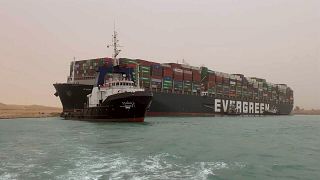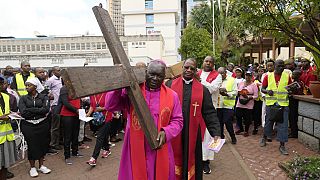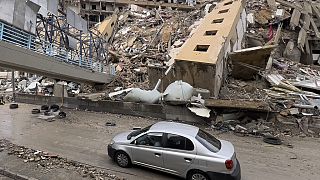Interview
With the world grappling with questions of receiving economies and livelihoods following the crippling effect of the Coronavirus induced lockdowns and restrictions, many have called for bailouts and capital injections into businesses.
As an executive member of the Development Bank of Southern Africa, Mohan Vivekanandan, is at the forefront of developing and deploying such solutions.
Africanews journalist, Afolake Oyinloye spoke to him in the following interview brought to you in partnership with AME Trade, an event management company based in London, United Kingdom.
He explains the thinking behind DBSA's major projects like investment in the Green Bond, Pension Funds and Alternative Investment.
What are some of the new investment strategies DBSA has put into play over the last year?
Mohan Vivekandan: "You know, one of the big areas in South Africa that that there's been a gap is in the energy sector. You know, we just haven't had enough power.
"So we've been putting in a lot of funding into new entrants, what are called the independent power producers, to come in and add to that the generation capacity of the utility. In fact, just last week, there was an announcement from government for almost 2000 megawatts of new energy and the DBSA supporting five of those projects.
"We think the total capital value of our funding can be close to 67 billion rands, almost 500 million dollars. That's just on the energy sector. You know, we are also entering into and growing our presence in social infrastructure as well.
+So this is in private hospitals, private provision of education and student accommodation and also into social housing to increase the stock of housing available for lower income people in South Africa in particular. So those are two areas in particular that that we've been growing our business in."
What investment areas does DBSA want to focus on to assist economic recovery through infrastructure development?
"Yes. And as you mentioned, you know, infrastructure is our focus. We typically do the equivalent of about a billion dollars worth of long term lending every year.
"Now, I mentioned the energy sector. I mentioned social infrastructure. Those are going to be two key growth areas for us.
"We continue to invest a lot in municipal infrastructure. Roughly a third of our funding goes towards working with our municipalities to continue to invest in critical infrastructure like water and sanitation, electricity distribution and rolling out the roads networks as well, simply because, you know, there's significant amounts of urbanisation happening. So the population of the bigger municipalities continues to grow rapidly.And so there's a lot of push on for that urban infrastructure as well. So that's the third.
"And then the last areas are on regional integration. We want to physically connect South Africa with the rest of the continent. I mean, we all know about the African Continental Free Trade Agreement, the opportunities that's going to create. And but it's only going to be available if South African goods can be exported easily into the rest of the continent. So we need to improve border post, railway links, road links between South Africa and the region."
Why has DBSA recently ventured into Green Bond and why has it become consequential ?
"The reality is, you know, there is a lot of investors, institutional investors that are looking to make sure that their funds are going towards sustainable infrastructure, including climate financing. So this two hundred million euro facility and it was a private placement with our long standing partners.
"The the French development agency AFD is on the one hand from our side. It allows us to get access to medium to long ten euro funding at reasonable rates. But it's also allowing us to expand over time the pool of funders, because there's a lot of these funders globally that are very interested in funding climate finance projects. And it allows us to tap into into that that source of funding to then on land into projects like renewable energy, green buildings, water and sanitation infrastructure.
During this pandemic, do you feel the use of technology in the alternative investment space has become more important?
**"**You know, absolutely. They're obviously the kind of infrastructure that we're funding is not quite alternative investments, per say.
"But I suppose we've all had to adapt. I mean, from ourselves. We've had to continue to be able to maintain our business relationships, do due diligence, even if we can't be on the ground, which makes it more challenging.
"But also you're seeing even new trends like crowdfunding of some social infrastructure, which is quite an interesting element as well. So so there are some some new technologies that are being deployed into the work that we do."
Why are events like the Pension Funds and Alternative Investments Africa so important for the sharing of industry knowledge and expertise?
**"**From the DBSA's perspective, You know, as I said, we focus on infrastructure and there's a very natural linkage between infrastructure as an asset class, which is pretty steady stream of income over a long period of time with the needs of institutional investors who are looking for exactly that.
"So, you know, it's a great marriage. And, you know, for us, though, it's to be able to tap into those sources of funding, you kno w, at the longest tenure as possible to be able to do the work that we do, but also continue to communicate to those investors the work that we are doing, because in some of the cases, you know, it's not as well known.
"And it's really about building that that symbiotic partnership between ourselves, you know, who's a funder, but then the institutional investors who can provide the long term capital and then working closely with project sponsors who are going to actually do the work on the ground. So it's a good marriage between the three of us."





![What are the Investment opportunities post-pandemic? [Interview]](https://static.euronews.com/articles/stories/05/45/59/10/320x180_cmsv2_24f4d7c0-ad83-5777-a89a-d59067e4659d-5455910.jpg)






11:05
Africa's hight cost of climate change [Business Africa]
01:17
COP29 finance talks lag as the summit reaches its halfway mark
01:38
COP29: What next for Africa's energy transition?
01:00
Civil society takes center stage at Brazil’s G20 social summit
01:58
Climate adaption: Unfulfilled pledges mean “lost lives and denied development” – UN chief
Go to video
Vladimir Putin affirms "full support" for Africa